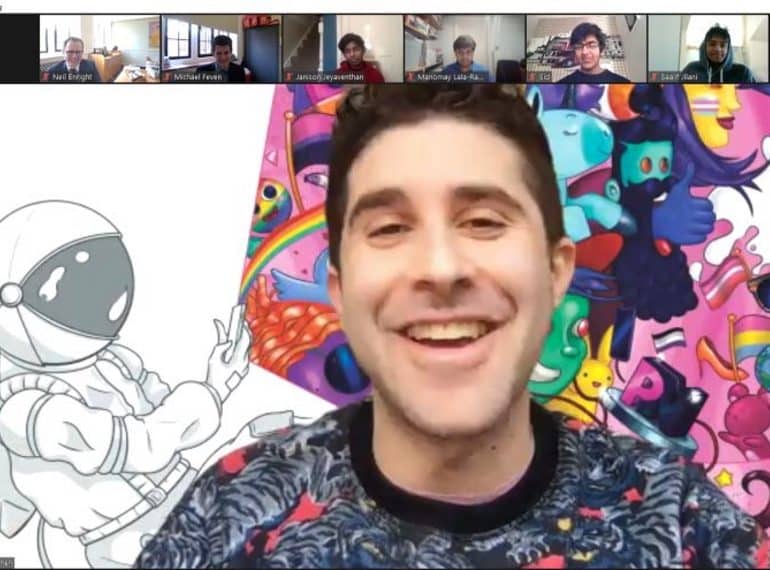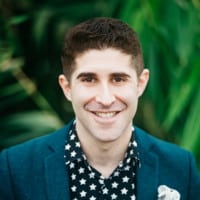As chance would have it: Ben Cohen charts his journey from teenage dotcom entrepreneur to boss of PinkNews

Benjamin Cohen highlighted the significant role that serendipity has played in the successful and very varied career he has enjoyed since he left QE 23 years ago.
 In a video conversation with the School’s Student Leadership Team and Equality, Diversity & Inclusion Ambassadors arranged during LGBT+ History Month, Ben (OE 1993–1998) told the story of his high-profile life from the age 15 to 38.
In a video conversation with the School’s Student Leadership Team and Equality, Diversity & Inclusion Ambassadors arranged during LGBT+ History Month, Ben (OE 1993–1998) told the story of his high-profile life from the age 15 to 38.
He took in his days as a dotcom millionaire, his emergence as a national newspaper columnist and TV correspondent, through to his current role as CEO of PinkNews – an online newspaper reaching tens of millions around the world which describes itself as “the brand for the global LGBT+ community and the next generation”.
He began by explaining that his time at QE was dogged by illness from when he was 12, around the time of his bar mitzvah. “I got glandular fever…I ended up not ever really recovering. I actually have MS now: it just took a long time to be diagnosed.”
It was because of his illness that he left QE immediately after his GCSEs and went to the Jewish Free School (now JFS) for his A-level studies. “When I was at JFS, I started my first business, right at the time of the internet first being a thing.”
This business was JewishNet.co.uk – “Britain’s first social network before the term was invented” – which offered an agony aunt, dating service, kosher recipes and even a cyber-rabbi. “I think serendipity is really important. I probably would not have started that if I had stayed at QE,” Ben told his audience of current QE pupils, before adding that he was not suggesting they should follow suit and leave!
They were heady days: “I found myself above Prince William in the Sunday Times Rich List – supposedly worth a lot of money.”
He then sold JewishNet and started another business, CyberBritain – “a dot.com darling for a couple of years” – which he ran during his gap year and then while at university. Among other things, it launched a UK-specific search engine powered by its own technology and attempted to establish a service similar to Spotify.
During much of his involvement with CyberBritain, Benjamin was also an undergraduate at King’s College London, where he read Religion, Philosophy and Ethics.
 If serependity was behind him going to JFS and starting his first business, it now played a part in another episode in his professional life. “Something really random happened: my then-business owned a lot of assets – domain names – and one of the domain names was itunes.co.uk. We just happened to own it.”
If serependity was behind him going to JFS and starting his first business, it now played a part in another episode in his professional life. “Something really random happened: my then-business owned a lot of assets – domain names – and one of the domain names was itunes.co.uk. We just happened to own it.”
Apple duly sued and this attracted the attraction of the national newspapers. “I was asked by the guy who was reporting on the story for The Times if I wanted to go to their Christmas party and I said, ‘Oh, why not?’”
At the party, he met The Times’ business editor, who asked him to write a column. “Weirdly, at the age of 21, I was writing a weekly column about e-business and technology…for The Times – mostly because the grown-ups didn’t really understand how the internet worked!”
When he then asked to write for the newspaper about LGB issues – as they were then termed – he was turned down, because someone else already had that role. “It was something I wanted to write, so I decided to write it anyway and put it up on the internet: I put it on a website I called PinkNews.co.uk – and everything kind of flowed from there.”
About a year later, while PinkNews was still small, he was asked by Channel 4 if he wanted to become its technology correspondent. An audition with the channel’s Jon Snow and Krishnan Guru-Murthy went well and Ben duly got the job. “I was 23 – the youngest-ever correspondent on a network news programme.”
For six years, he fulfilled that role alongside his work for PinkNews, which took a leading role in the battles over same-sex marriage – “equal marriage”. With Ben leading this campaign, he eventually felt he should concentrate on it full-time and so he left Channel 4. (From 2010 until 2017, he did, however, do work as a presenter for the BBC, including writing and presenting a critically acclaimed documentary, I was a teenage dot.com millionaire. He is also a longstanding UK trustee and non-executive director of Humanity & Inclusion, a global disability development charity.)
PinkNews has, he says, “grown and grown and grown”. And that growth had actually accelerated during the pandemic. “This time last year, we had 20 people that worked at PinkNews; now it’s over 40….Every month, about 50 million people consume our content,” he said. As well as attracting views through its website, PinkNews gains heavy exposure as the exclusive LGBT content provider on Snapchat, where it has seven channels, on Twitter, where it is the exclusive LGBT video partner, and on other social media channels.
“It has grown into quite a big business. I don’t really have to do any of the writing or anything like that any more because I have a whole team that does that,” he said.
Ben’s video session was recorded so that it can be used by form tutors to stimulate discussion among all year groups as an eQE online resource within QE’s personal development and wellbeing programme.
After his talk, there was a Q&A session when boys asked questions on topics including religion & LGBT rights, barriers still facing LGBT people and national changes in sex education and religious education.
To read more about the Q&A session, read our news report on the visit here.
